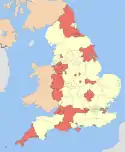Wiltshire Council
Wiltshire Council is a council for the unitary authority of Wiltshire (excluding the separate UA of Swindon) in South West England, created in 2009. It is the successor authority to Wiltshire County Council (1889–2009) and the four district councils of Kennet, North Wiltshire, Salisbury, and West Wiltshire, all of which were created in 1974 and abolished in 2009.
Wiltshire Council | |
|---|---|
 | |
| Type | |
| Type | |
| History | |
| Founded | 1 April 2009[lower-alpha 1] |
| Preceded by | Wiltshire County Council District councils
|
| Leadership | |
Chairman of the Council | |
Leader of the Council | |
Chief executive | Terence Herbert[1] since 26 June 2020 |
| Structure | |
| Seats | 98 councillors |
 | |
Political groups |
|
Length of term | 4 years |
| Elections | |
| First past the post | |
Last election | 4 May 2017 |
Next election | 6 May 2021 |
| Meeting place | |
 | |
| County Hall, Trowbridge | |
| Website | |
| wiltshire | |
Establishment of the unitary authority
The ceremonial county of Wiltshire consists of two unitary authority areas, Wiltshire and Swindon, administered respectively by Wiltshire Council and Swindon Borough Council. Before 2009, Wiltshire was administered as a non-metropolitan county by Wiltshire County Council, with four districts, Kennet, North Wiltshire, Salisbury, and West Wiltshire. Swindon, in the north of the county, had been a separate unitary authority since 1997, and on 5 December 2007 the Government announced that the rest of Wiltshire would move to unitary status. This was later put into effect by a statutory instrument as part of the 2009 structural changes to local government in England.
With the abolition of the District of Salisbury, a new Salisbury City Council was created at the same time to carry out several citywide functions and to hold the City's charter.
Functions
The unitary authority provides local government services to 435,000 Wiltshire residents and is also the biggest employer in Wiltshire, being responsible for schools, social services, rubbish collection and disposal, county roads, planning, and leisure services.
Most executive decisions are taken by the authority's cabinet, each member of which has a particular area of responsibility. Development control is undertaken by five planning committees, the powers of which cannot be exercised by the cabinet. Members of the authority are appointed to a wide range of outside bodies, providing them with some element of democratic accountability, such as the Kennet and Avon Canal Trust, the Wiltshire Victoria County History, and the Wiltshire Historic Buildings Trust.
Political balance
As a result of the first elections to the new authority, plus two by-elections held in September 2009 and December 2010, an Independent joining UKIP while remaining in the Independent group,[2] a defection in May 2012 by a Liberal Democrat councillor to the Conservatives,[3] and in November 2012 by another Lib Dem and a Conservative to the Independents,[4] by the beginning of 2013 Wiltshire Council consisted of 61 Conservatives, 22 Liberal Democrats, ten Independents including one UKIP member, three Devizes Guardians, and two Labour members.
The elections of 2013 produced an unexpected swing to the Liberal Democrats, who made a net gain of five seats, while all three Devizes Guardians lost their seats to the Conservatives and the Labour group increased from two to four. The overall result was 58 Conservatives, 27 Liberals, eight Independents, four Labour, and one UKIP member.[5] However, during the following year four Liberal Democrats defected from their political group: one to the Conservatives and three to the Independents. In a by-election in May 2015 at Chippenham Hardenhuish the Conservatives gained a seat from the Liberal Democrats, and in November they gained another at Salisbury St Edmund, then at a by-election in May 2016 the Liberal Democrats gained Amesbury East from the Conservatives.
The 2017 election resulted in the Conservatives increasing their share of seats at the expense of the Liberal Democrats, Independents, Labour and UKIP.
| Political group | Councillors | ||||
|---|---|---|---|---|---|
| 2009 | 2013 | 2017 | Current[6] | ||
| Conservative | 62 | 58 | 68 | 62 | |
| Liberal Democrat | 24 | 27 | 20 | 21 | |
| Independent | 7 | 8 | 7 | 11 | |
| Labour | 2 | 4 | 3 | 3 | |
| Devizes Guardians | 3 | 0 | 0 | 0 | |
| UK Independence Party | 0 | 1 | 0 | 0 | |
| Total | 98 | 98 | 98 | 97 | |
Wards
There are 98 wards in Wiltshire.
County Hall
Wiltshire Council operates from the same Trowbridge base as the old Wiltshire County Council. In 2012 the County Hall building was renovated and developed at a cost of about £24 million. The remodelled New County Hall includes benefits services and housing advice, the Trowbridge library, the town's Register Office, and a cafe.[7][8][9]
See also
Notes
- County council gained unitary authority functions.
References
- "Cash strapped county unitary names new chief". Local Government Chronicle. 29 June 2020. Retrieved 1 July 2020.
- Explanation by Cllr Cuthbert Murray at westburytownforums.co.uk that he is both a UKIP member and an Independent
- "Wiltshire councillor joins Conservatives". ConservativeHome. 22 May 2012. Retrieved 23 May 2012.
- Gerald Isaaman, Councillor Peggy Dow quits the Lib-Dems as they suffer election humiliation at the polls (marlboroughnewsonline.co.uk)
- Election results at Wiltshire Council website
- "Your Councillors". Wiltshire Council. Retrieved 24 July 2019.
- "Wiltshire Council's £22 million HQ is officially opened". Wiltshire Times. 1 November 2012.
- "Peek at £24m Wiltshire County Hall revamp (From Wiltshire Times)". Wiltshiretimes.co.uk. 23 March 2012. Retrieved 30 September 2013.
- "Trowbridge County Hall Redevelopment – Integral". Integral-engineering.co.uk. Retrieved 30 September 2013.

.png.webp)
.png.webp)
.png.webp)
.png.webp)
.png.webp)
.png.webp)
.png.webp)